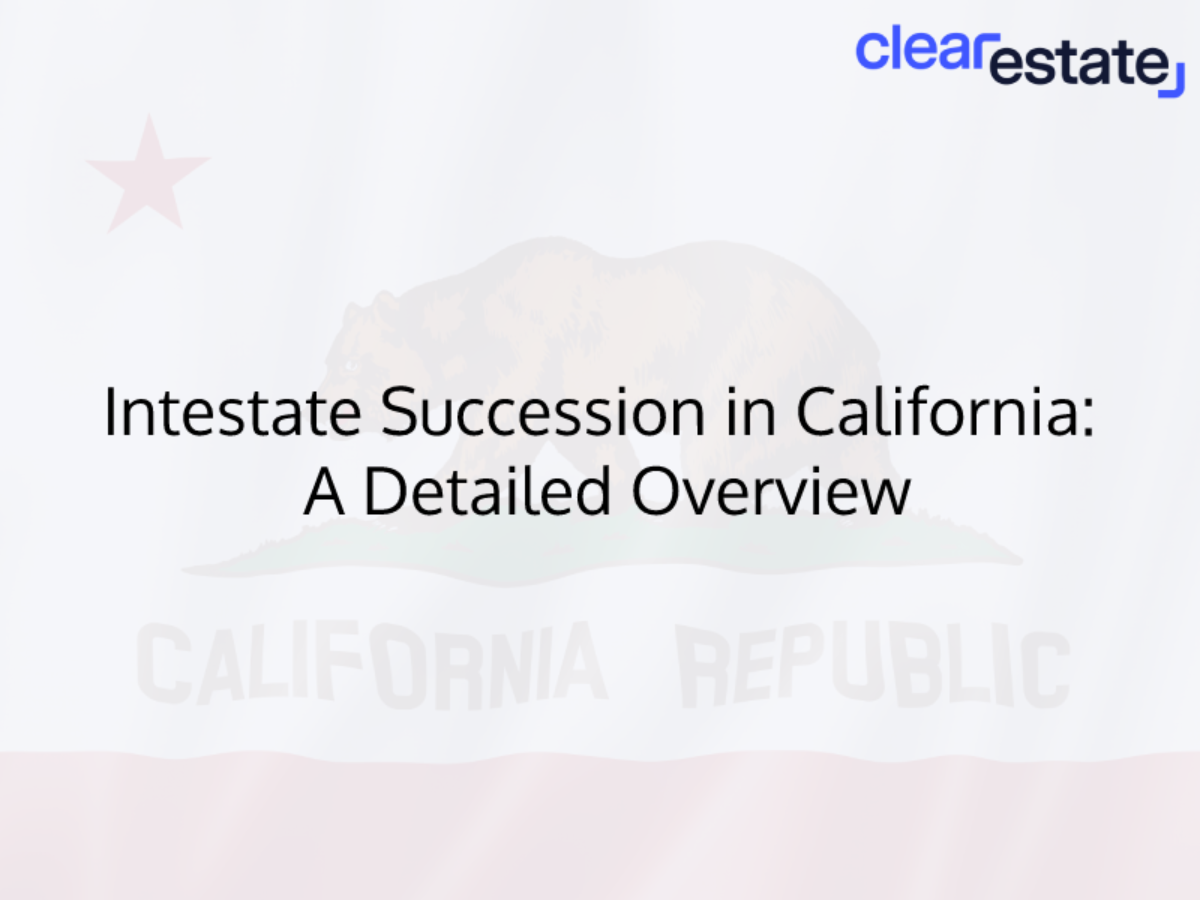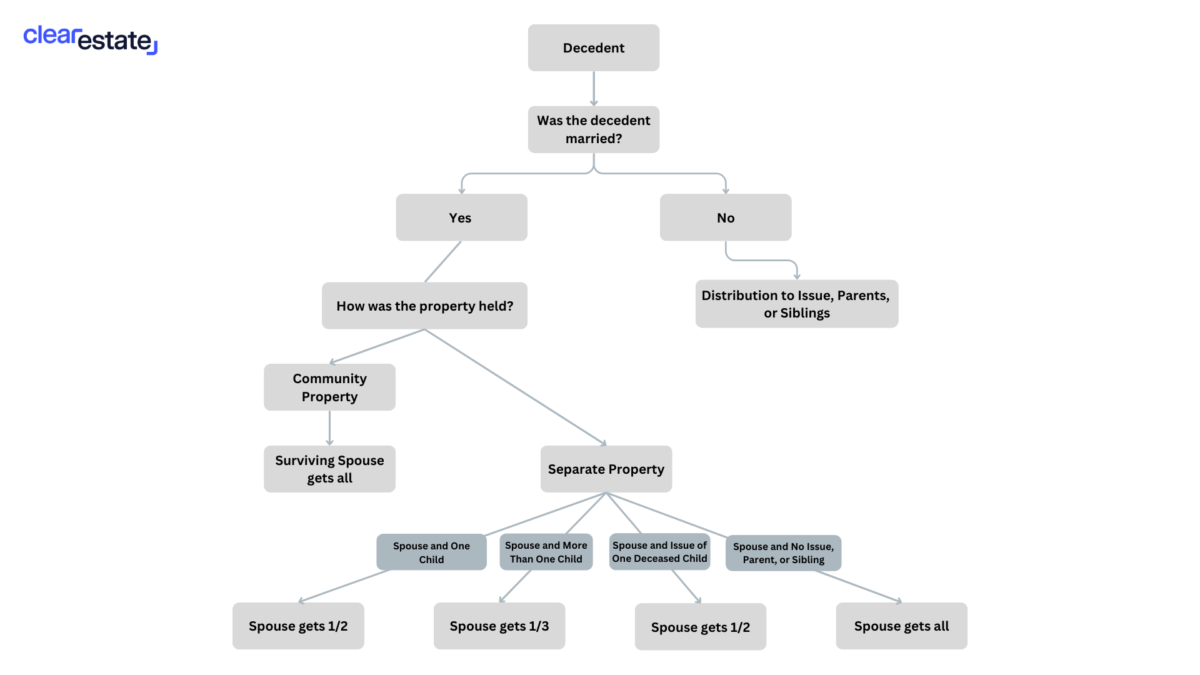Estate Settlement
Dec 04, 2024
How to Stop Mail for a Deceased Person: 5 Steps
Learn how to stop mail for a deceased person with our 5-step guide to protect their identity and ease estate management.
A comprehensive guide to intestate succession in California, covering estate distribution, probate, and more.


Article Contents
Intestate succession is the process by which an estate is distributed if the decedent passed away without having a valid will or if personal property or estate assets are not placed within the will. In California, intestate succession is governed by the California state probate code §6400-6455.
In California, the distribution of assets depends on the deceased's marital status, closest relatives, and how property was held.
Here's a simplified breakdown:
For Unmarried Individuals: If the deceased was not married but had adopted or biological children, the children equally inherit all assets. If there are no children, but the deceased's parents are alive, they inherit all assets. If there are no surviving parents, the siblings inherit all assets equally. If there are no siblings, the inheritance order is as follows: grandparents, then aunts or uncles, and then cousins.
For Married Individuals or Registered Domestic Partners: In California, registered domestic partners are treated the same as spouses for intestate succession purposes. If the deceased was married or in a registered domestic partnership at the time of death, the distribution of assets is divided into two categories: community property and separate property.
Community Property: Community property in California is classified as assets acquired during marriage, but excludes any inheritances or gifts received during the marriage. In California, both spouses or partners have an equal interest in community property. Upon the death of one spouse or partner, their 50% share of the community property automatically passes to the surviving spouse or partner, without going through probate.
Separate Property: Separate property in California is classified as property acquired before marriage or received during the marriage through inheritance or a gift. It also includes any earnings or assets acquired after legal separation. In the event of death without a will, the surviving spouse or partner typically inherits 50% of the separate property. The remaining 50% is distributed to the deceased's children, parents, siblings, and other relatives, according to California's intestate succession law.
| Deceased’s survivor(s): | Who Inherits: |
| Children but no spouse | Children inherits everything |
| Spouse with no children, or no immediate next of kin (parents, siblings, nieces, cousins) | Spouse inherits everything |
| Sibling with no other next of kin (parents, children, spouse, relatives) | Siblings inherit |
| Spouse and 1 child | Spouse inherits all community property and ½ (50%) of the deceased’s separate property. |
| Spouse & 2+ children | Spouse inherits all community property & ⅓ of deceased's separate property; with children inheriting an evenly split remaining ⅔ of separate property. |
| Spouse and parents of the deceased | Spouse inherits all community property, and ½ (50%) of the deceased’s separate property - with the parents inheriting the remaining ½ (50%) of separate property. |
| Spouse and siblings, no surviving parents | Spouse inherits all community property, and ½ (50%) of separate property. Siblings inherit the remaining ½ (50%) of separate property. |
To help illustrate the property distribution by California's intestate laws, our professionals at ClearEstate put together a useful California intestate succession chart to help the visual learners understand a bit better:

While intestacy laws dictate the distribution of a deceased person's property when they die without a will, it's important to note that not all assets are subject to intestate laws. Certain types of property are passed directly to named beneficiaries or co-owners, regardless of whether the deceased left a will. Here are some examples:
Living Trusts: Any property that the deceased transferred to a living trust is not subject to intestate succession. Instead, it goes directly to the beneficiary named in the trust document.
Life Insurance Proceeds: The payout from a life insurance policy is not governed by intestate succession. It goes directly to the named beneficiary on the policy.
Retirement Accounts: Funds in retirement accounts, such as an IRA or 401(k), bypass intestate succession. These funds are distributed directly to the named beneficiary on the account.
Transfer-on-Death Accounts: Securities held in a transfer-on-death account, or payable-on-death bank accounts, are not subject to intestate succession. These assets are transferred directly to the named beneficiary upon the account holder's death.
Jointly Owned Property: Property owned with someone else in joint tenancy or as community property with the right of survivorship is not covered by intestate succession. Upon the death of one owner, the property automatically passes to the surviving owner.
The intestate succession process in California deals with how an individual’s estate is distributed when they die without a will, while the probate process is somewhat similar in intestate scenarios there are some differences in-between a regular probate proceeding and an intestate probate case.
Below is a step-by-step format of the intestate succession process in California:
If the decedent is survived by a spouse or domestic partner, a spousal property petition can be filed. This can help in transferring assets to the surviving spouse or domestic partner without going through the full probate process.
120 Hour Survivorship Period (Probate Law 6403) This law stipulates that for the purpose of intestate succession, a person who doesn't survive the decedent by at least 120 hours is considered to have predeceased the decedent.
Equal Inheritance Rights for Half-Blood Relatives (Probate Law 6406) This law ensures that half-blood relatives inherit the same share as they would if they were of the whole blood.
Inheritance Rights of Posthumous Relatives (Probate Law 6407) This law states that relatives conceived before but born after the decedent's death inherit as if they had been born during the decedent's lifetime.
Inheritance Rights Irrespective of Citizenship (Probate Law 6411) This law asserts that a person's citizenship or nationality does not disqualify them from inheriting as an heir.
Disqualification of Killers from Inheritance (Probate Law 250) This law disqualifies any person who feloniously and intentionally kills the decedent from inheriting any property, interest, or benefit under the decedent's will or trust.
Dying intestate means passing away without a valid will. When this happens, the deceased person's assets are distributed according to intestate succession laws, which vary by state.
When a person dies without a will in California, their estate is distributed according to intestate succession laws. Under California Probate Code, assets typically pass to the closest relatives, starting with the surviving spouse and children. If there is no spouse or children, the estate goes to parents, siblings, and more distant relatives in a specific order. Wondering who inherits when there is no will? Check out our table detailing the Order of Estate Distribution by Intestate Succession Laws in California to see how assets are passed down under state law. To avoid probate complications, estate planning is essential.
According to California's intestate laws - spouses do not automatically inherit all property. This is only the case when the decedent passed away without any surviving relatives, or if all property is owned and held jointly.
In California, probate may not always be required for the surviving spouse. If the deceased spouse estate is composed solely of community property or the assets were held in joint tenancy with another individual, including the surviving spouse, the estate can sidestep the probate court.
 Simplify Probate Today
Simplify Probate Today
Get expert guidance from our specialists who've helped 10,000+ families.
Book a free consultation